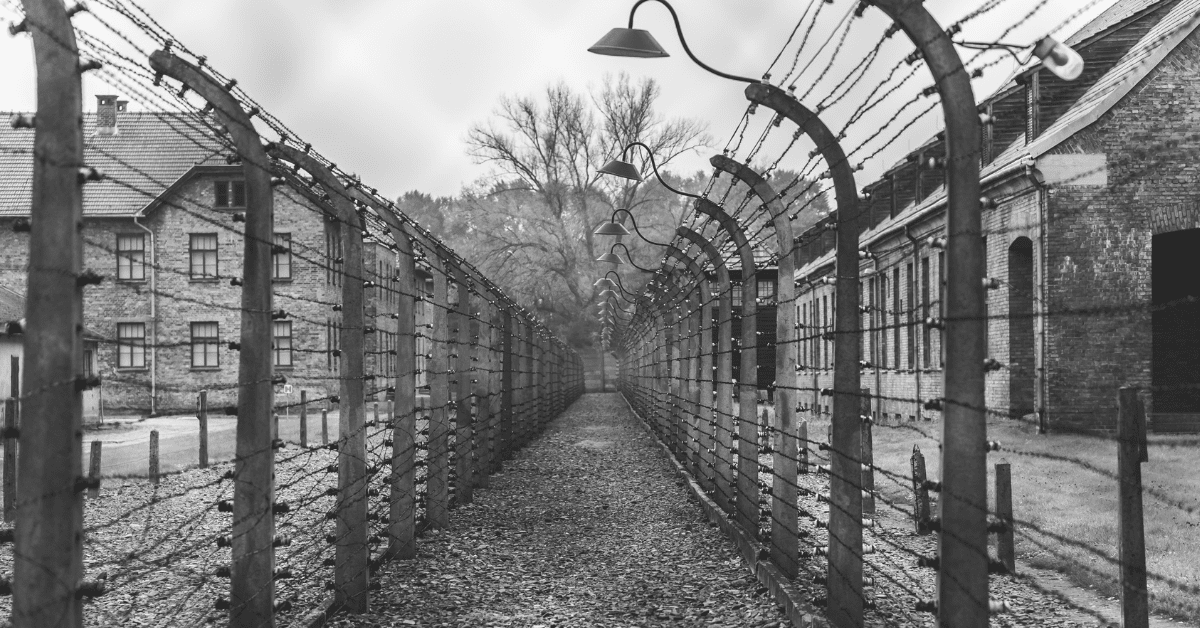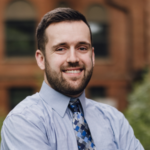On a walking tour through Auschwitz, I notice my normally talkative group has gone stone silent, not asking our guide even a single question. At a few points on the tour, I feel an urge to pray. To pray while standing on the ground where countless atrocities occurred not even a lifetime ago. But each time I start, I find myself saying “O God” and then unable to proceed. This is the only prayerful utterance I can muster. In this space and time, I can’t help but focus on the horrendous cruelty and brutality that occurred at Auschwitz. I feel the weight of the truth that this place was not a remote location run by a few fanatics, but rather a site made possible through the widespread complicity, complacency, and indifference of millions who fueled the genocidal operation.
For me, these truths dug into my whole being while at Auschwitz in early July. I had the privilege of being a Seminary Fellow in the Fellowship at Auschwitz for the Study of Professional Ethics Program, where alongside other incredible Seminary, Journalism, and Medical Fellows, amazing faculty members, program staff, and local guides, we traveled around Berlin, Krakow, and Auschwitz for two weeks. We engaged in seminars, tours, large and small group discussions, and other activities, to both explore the decisions made by professionals in the time of Nazi Germany and to challenge ourselves to question and understand our own ethical responsibilities today.
It’s important to remember that Auschwitz didn’t just appear out of thin air. The path to a specific space that would be the location of so much suffering and so much death took time. It took the decisions and indifference of millions of people. And while people from the nearby town were expelled when Auschwitz was built, other camps were very much connected to the daily lives of general citizens. There were not just a few camps established, but rather, as I learned from a map at the German Resistance Memorial Center in Berlin, over 44,000, ranging from work camps near factories to camps for political prisoners, to camps like Auschwitz-Birkenau, which functioned as both a work and extermination camp. They were everywhere. At that same museum, I learned the stories of many people who worked to oppose Nazi policies and programs, many of whom were executed for their attempts. But everywhere we traveled, I was constantly reminded of the people who said nothing, and of the people who spoke and worked in favor of genocide.
As a Seminary Fellow on this trip, I thought extensively about how religion was at work. I thought about an image of a pastor blessing Nazi soldiers. I thought about how many Christians in Germany threw their support behind Adolf Hitler. I thought about how religion was forbidden within the camps because it could be a source of hope. I thought about how the latrines were a place where group prayer could occur because they were too disgusting for Nazi SS soldiers to desire to enter them. In the midst of this, I also thought of Martin Luther, many of whose theological writings have brought me to know God as loving and full of grace, but who also wrote “On The Jews and Their Lies,” a horribly anti-Jewish work that was lauded and used by the Nazis.
Since returning to the United States, I’ve thought deeply about “O God.” Why did those words come to mind? Why couldn’t I find anything else to pray? Were those words a cry of despair, a mournful whisper, an angry shout, a reaction to an unbearable weight? Yes, certainly all of those, and probably much more than that.
I also keep thinking about the phrase written on the cover of the notebooks the program gave us: “Question Your Ethics.” A statement both open-ended, and quite pointed. A call to not simply submit to any ethical system, but rather to spend time thinking about the foundations for, and implications of, any ethical reasoning.
“O God” and “Question Your Ethics,” continue to percolate in my mind. I currently see both phrases as calls. I see “O God” as me calling to God. Calling with all that I was feeling as I stood on the grounds of Auschwitz, a calling that persists as I continue to think about how my learning experiences will shape me and what I am called to do with that today. I look at the world around me, and I find myself wondering what would happen if, instead of scrambling for the right answer, we could find a way to sit with a simple “O God” when those are the best words to be spoken.
“Question Your Ethics,” feels like a calling and a plea. A sometimes pain-filled and pressing plea in an increasingly divisive world, where we dig our heels in on issues so quickly and vilify those who disagree with us, seeing ourselves as champions of the “right way.” What would happen if we consistently and honestly looked at our grounding principles, our ethical foundations, and considered how they may need to shift or change depending on their impact on other people?
As I began working on this reflection, I wasn’t sure I was ready to share my thoughts and experiences of these two immersive and intense weeks. But then I thought, maybe this is just living in the reality of “O God” and “Question Your Ethics.” There’s always going to be a level of uncertainty, and that’s okay, maybe even preferable. It’s freeing to not have to dig my heels in so deep, to remember that I can know where I stand in the moment, while remaining open to how that could change. I believe that in order to be an ethical leader, one must pay attention to caring for the neighbor and maintain a willingness to change when your ethical system no longer serves this purpose. To do this important work, it seems necessary to be able to cry out “O God,” while working toward being comfortable with the silence that follows, knowing that, sometimes, these are the only words you can say.
It is both comforting and distressing to know that God’s people have cried out in great lament for thousands of years. I am comforted to be a part of a community that has this practice, yet troubled to be a part of a world that contains pain requiring such lament. The rich Judeo-Christian tradition of lament, especially embodied in the Psalms, just might speak words into a void of pain and grief to which no other words come. My mind is drawn to the opening of Psalm 22 which I have placed below as an example of this lament, voice in the Psalm itself, part of which is later repeated by Jesus on the cross, and words that feel eerily similar to my own expression of “O God.”
Psalm 22:1-2 (NRSVUE)
My God, my God, why have you forsaken me?
Why are you so far from helping me, from the words of my groaning?
O my God, I cry by day, but you do not answer;
and by night but find no rest.
I can’t help but think about how many others may have thought of these words on the ground upon which I stood, those imprisoned at Auschwitz, those who have been there in the following decades, those who experienced similar horrors at other camps. The cries of lament uttered for decades still feel insufficient to address the evil that occurred. And yet, these cries are not simply lost in a void, they are heard, received, and held by God. God takes them as they are, raw and unpolished. God hears the groaning and remains with us, even in the face of such evil.



